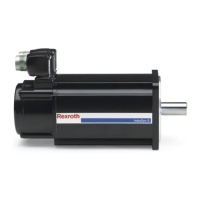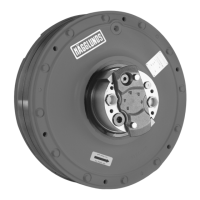Bosch Rexroth AG, RE 91001-01-X-B2/01.2016
4 A2FM for explosive areas | Axial piston fixed motor
Hydraulic fluids
Viscosity and temperature of hydraulic fluids
Viscosity Temperature Comment
Cold start
ν
max
≤1600mm
2
/s θ
St
≥−40°C t≤3min, n≤1000rpm, without load p≤50 bar
Permissible temperature difference
ΔT≤25K
between axial piston unit and hydraulic fluid in the system
Warm‑up phase
ν<1600 to 400mm
2
/s θ=−40°C to −25°C at p≤0.7×p
nom
, n≤0.5×n
nom
and t≤15min
Continuous operation
ν=400 to 10mm
2
/s
this corresponds, for VG46 for example, to a temperature
range of +5 °C to +85 °C (see selection diagram)
Temperature class T3
θ=−25°C to +90°C
measured at port T
observe permissible temperature range of the shaft seal
ring (ΔT=approx.12K between bearing/shaft seal and
port T)
Temperature class T4
θ=−25°C to +70°C
ν
opt
=36 to 16mm
2
/s
Range of optimum operating viscosity and efficiency
Short‑term operation
ν
min
≥7mm
2
/s t<3min, p<0.3×p
nom
▼ Selection diagram
-40 -25 -10 10 30 50 90 11570
0
7
10
40
60
20
100
200
400
600
1000
1600
VG 22
VG 32
VG 46
VG 68
VG 100
16
36
Optimum operating viscosity range v
opt
Optimum efficiency
Maximum permissible viscosity for cold start
Minimum permissible viscosity for short‑term operation
Temperature θ [°C]
Viscosity ν [mm
2
/s]
Continuous operation
Warm‑up phase
Minimum permissible temperature for cold start
Filtration of the hydraulic fluid
Finer filtration improves the cleanliness level of the hydraulic
fluid, which increases the service life of the axial piston unit.
A cleanliness level of at least 19/17/14 is to be maintained
according to ISO4406.

